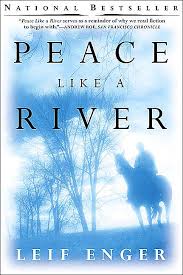
As I navigated the final pages of Leif Enger's first novel Peace Like a River, my heart was thumping and tears were welling up. This book affected me deeply. In fact, after finally completing the work a week ago I would venture to say it was one of the most powerful illustrations of the Christian life that I have ever encountered. And in many ways, I would argue, it portrays a vivid and gripping "Biblical" understanding of what true godliness looks like. Here's a few thoughts on the Leif Enger's work:
Peace Like a River is told through the eyes of eleven-year-old Reuben Land, who speaks with the sort of voice you'd find in a Mark Twain novel, fresh and unique. To illustrate, here are the opening words of the book:
Peace Like a River is told through the eyes of eleven-year-old Reuben Land, who speaks with the sort of voice you'd find in a Mark Twain novel, fresh and unique. To illustrate, here are the opening words of the book:
From my first breath in this world, all I wanted was a good set of lungs and the air to fill them with-- given circumstances, you might presume, for an American baby of the twentieth century. Think about your own first gasp: a shocking wind roweling so easily down your throat, and you still slipping around in the doctor's hands. How you you yowled! Not a thing on your mind but breakfast, and that was on the way.
When I was born to Helen and Jeremiah Land, in 1951, my lungs refused to kick in
My father wasn't in the delivery room or even in the building; the halls of Wilson Hospital were close and short, and Dad had gone out to pace in the damp September wind. He was praying, rounding the block for the fifth time, when the air quickened. He opened his eyes and discovered he was running-- sprinting across the grass toward the door.
"How'd you know?" I adored this story, made him tell it all the time.
"God told me you were in trouble."
"Out loud? Did you hear Him?"
"Nope, not out loud. But He made me run, Reuben. I guess I figured it out on the way."
As you read on, Peace Like a River unfolds in riveting fashion-- I'll leave the surprise to you. But what really captured my imagination was interplay between the life of a man completely devoted to God-- Jeremiah Land, Reuben's father-- and the world about him, which was filled with every kind of evil. The reality that this world is not our home and is in fact hostile to God is painted with a flavor of real truth. This worldview is nowhere as clearly defined as it is at the end of the first chapter in the words of Jeremiah Land:
We and the world, my children, will always be at war.
Retreat is impossible.
Arm yourselves.
So many other "Biblical" truths are played out in Enger's story, as well: the consequences and destruction that follow disobedience to authority, the moral dilemmas of speaking truthfully verses lying, the interaction between God's sovereignty and human choice, the goodness and love of God... And then there's the subject of "miracles", which is to the narrator of primary importance. As Reuben pondered the amazing miracles God performed through his father, beginning with the first miracle of raising Reuben from the dead as a baby, he said the following:
Overall, Leif Enger's first major novel appears to be one that may stand the test of time as one of the best under the category of Christian fiction. Read this book. I think you'll like it.
I believe I was preserved, through those twelve airless minutes, in order to be a witness, and as a witness, let me say that a miracle is no cute thing but more like the swing of a sword. (Itallics mine)
Overall, Leif Enger's first major novel appears to be one that may stand the test of time as one of the best under the category of Christian fiction. Read this book. I think you'll like it.
Also worth checking out: What John Piper has to say about Peace Like a River .




No comments:
Post a Comment